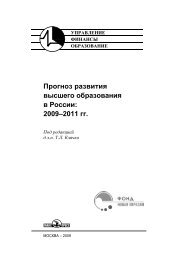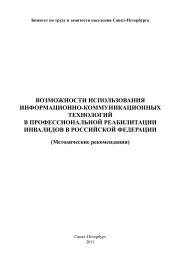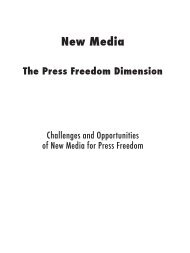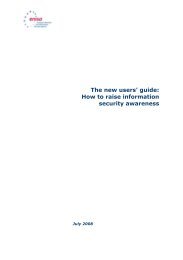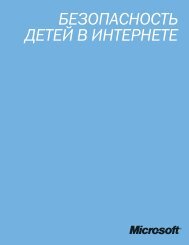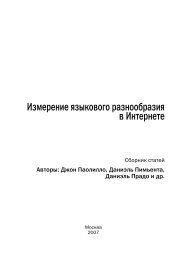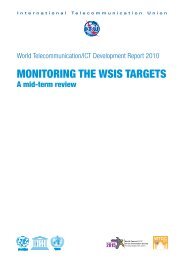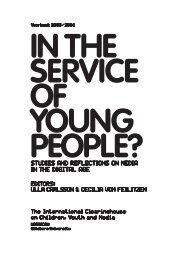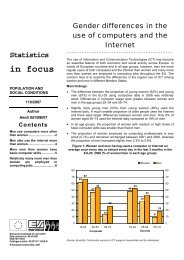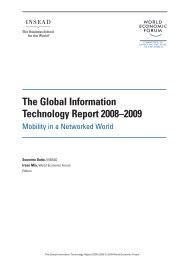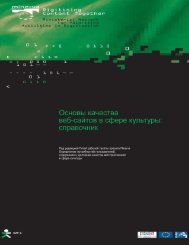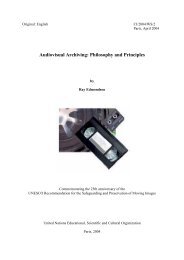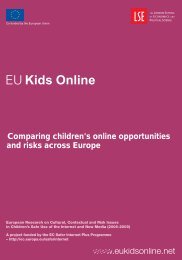Creative Economy: A Feasible Development Option
Creative Economy: A Feasible Development Option
Creative Economy: A Feasible Development Option
- No tags were found...
Create successful ePaper yourself
Turn your PDF publications into a flip-book with our unique Google optimized e-Paper software.
Box 1.5Cirque du Soleil: A very simple dream1Cirque du Soleil is an international company from Quebec dedicated to the creation, production and distribution of artistic works. Founded by GuyLaliberté in 1984, it began with a group of 73 young artists and creative entrepreneurs with a shared spirit of offering its creators the freedom to dreamthe wildest dreams and make them come true. Today, the business has over 3,800 employees worldwide, including close to 1,000 artists, representsover 40 nationalities, and speaks 25 different languages. Cirque du Soleil's touring shows have made nearly 250 stops in over 100 cities around theworld and more than 70 million spectators have seen a Cirque du Soleil show since 1984.Cirque du Soleil is primarily a creative content provider for a wide variety of unique projects. The organization’s mission is to invoke the imagination, provokethe senses and evoke the emotions of people throughout the world. Cirque du Soleil is a generator of new experiences, a laboratory and platformfor creators. It is constantly researching new artistic avenues and innovating within the organization. In 2007, Cirque du Soleil presented 15 differentshows around the world. The heart of its activity remains creating live shows and presenting them under big tops, in theatres or in arenas. Since 1984,close to 200 creators from the four corners of the globe have contributed their talents to this end.Cirque du Soleil wants above all to take its place in society as a good citizen, with all the duties and responsibilities that go with citizenship. Since 1989,it has elected to give 1 per cent of its annual turnover to social and cultural programmes as a concrete expression of citizenship that goes beyond itsbusiness markets. Circus arts also offer young people the chance to open up, express themselves and use their marginalized status as a tool to makenew links with a society that often excludes them. This is how Cirque du Soleil has developed its international expertise and leadership in social circus.Cirque du Monde is one of the greatest sources of pride for Cirque du Soleil. Set in motion in 1995, this programme is now operating in association withpartners in social and cultural action such as Oxfam International and Jeunesse du Monde to assist young people in more than 80 communities in morethan 20 countries throughout the world.Concept and context of the creative economyCirque du Soleil also remains an active member of the artistic community. It supports artists and artistic institutions in various ways and is involved inmany cultural organizations. The company offers financial support to innovative projects created by emerging artists and artistic companies.By Charles Beraud, Office of the Senior Vice President of Marketing, Cirque du Soleil.1.3.3 Cultural aspectsWhether the term “culture” is interpreted in ananthropological sense to mean the shared values and traditionsthat identify a community or a nation and bind ittogether, or in a more functional sense to mean the practiceof the arts, the creative economy clearly has profound culturalimplications. Perhaps these effects are best summarizedby the proposition that cultural activities give rise toboth economic and cultural value; it is the latter that providesthe distinctive contribution that these products maketo individuals, to the economy and to society. From a policyperspective, the generation of cultural value alongsideeconomic value from the operation of the creative industriesis relevant because it serves the cultural objectives of society,which stand alongside the economic objectives of a governmentand are reflected in the broad reach of its culturalpolicy. The cultural value of identity is especially important,whether understood at the level of a nation, region, city,town or community.Diversity is a cultural dimension of the creative economythat became more prominent in recent years. Asprocesses of globalization continue, the value of culturaldiversity has been more sharply defined and the role of thecreative industries in promoting it has been more clearlyunderstood. The Universal Declaration on Cultural Diversityadopted by UNESCO in 2001 sees diversity as being embodiedin the “uniqueness and plurality” of the identities of varioussocieties and groups, a common heritage of humankind.Since culture itself is intrinsic to the realization of humanaspirations, it is argued that cultural diversity will be animportant factor in promoting economic, social and culturaldevelopment. These sentiments were in turn given substancein the Convention on the Protection and Promotion of theDiversity of Cultural Expressions which specifically identifiesthe cultural industries as essential to the achievement of thebenefits of cultural diversity in developed and developingcountries alike.In 2009, the UNESCO World Report “Investing inCultural Diversity and Intercultural Dialogue” 45 analysed thenature and manifestation of cultural diversity in relation toglobalization, intercultural dialogue, human rights and45 More information available from http://www.unesco.org/en/world-reports/cultural-diversity.CREATIVE ECONOMY REPORT 201025



